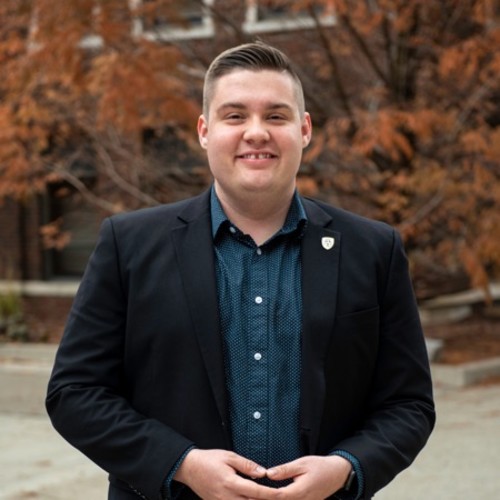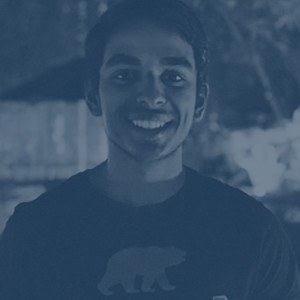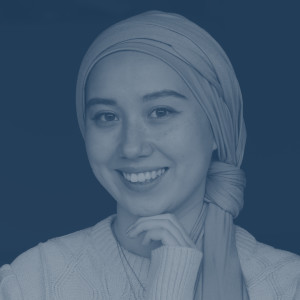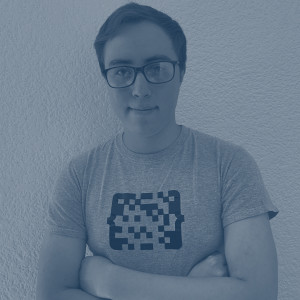Noah Campbell, 23

Noah made an unexpected entrance to the hacker community during his tenure leading the Google Developer Student Club at the University of Windsor when several team members came to him asking to host a hackathon. Having never attended a hackathon, he was intrigued but unsure of how to start the process, so he spent a night learning about what hackathons are, and found himself excited about the innovative and engaging events that hackathons offer. Noah knew the coordination such an event would require, as he had organized the 2019 Canadian Undergraduate Computer Science Conference at his school, as well as several workshops, demo days, and experiential learning events. Noah formed a strong and diverse team from the University, College, and Windsor-Essex region to host WinHacks, the region’s first-ever post-secondary hackathon, and they were driven to create an amazing event that would attract outsiders to the region.
Then a once-in-a-century pandemic was thrown into the mix, and Noah was set for an interesting, challenging, and rewarding experience. With two weeks’ notice, the event had to quickly pivot to a completely digital form, so Noah led his team in establishing partnerships with local, national, and global sources to raise over $50,000 for the event. Noah’s 30-member team pulled together an amazing event with 400+ participants who built 77 innovative projects. WinHacks became one of MLH’s first-ever digital hackathons, and Noah’s team helped other hackathons have more seamless transitions to virtual domains, as he shared their work in talks with MLH and a presentation at Hackcon with hopes of empowering others to make an impact in their own communities. His leadership role in WinHacks allowed him to be a hackathon expert at his first ever hackathon, and he gained valuable experience in sponsorships, stakeholder relations, public speaking, logistics management, and organization—skills that helped shape his current and future career, and even landed him an organizer job with the event’s main sponsor, Invest WindsorEssex
His job started by having Noah repeat the success of WinHacks 2020 in planning a second regional hackathon BorderHacks 2020, where he forged a cross-border partnership with the United States Department of State to connect and inspire Canadian and American students virtually during COVID-19. The event converged academia and industry with governmental support to build a community of hackers and give them tangible opportunities, and organizing the event allowed Noah to further refine his collaborative and organizational skills. He continued paying these experiences forward at the same job, where he provided funding and guidance to the WinHacks 2021 team in a professional capacity. At BorderHacks and WinHacks, he managed to attract influential tech companies in both regions to participate, creating enhanced opportunities for students on both sides of the border. One of these organizations was WaveDirect Telecommunications. WaveDirect contributed significantly to the event through prizing and mentorship and even hired their challenge winner as a co-op student. Later, they hired Noah, as part of their enhanced efforts to collaborate meaningfully with the community, stemming from their participation at BorderHacks. Noah is amazed that hosting hackathons has allowed him to establish a regional legacy and train teams of organizers who will continue to help the events and region grow for many years to come.
Noah and the organizers he has worked with share a vision that prioritizes unity and progress, with the whole Windsor-Essex region working together to build a vibrant tech community as catalyzed through the hackathons. The Windsor-Essex region is an oft-forgotten pocket of Canada that has borders overlapping the United States, and it is commonly not even printed on maps of Canada. Noah vows that they will not be forgotten anymore. By pioneering events in the Windsor-Essex region, Noah’s team created a platform for others to learn new skills, showcase their projects, connect with industry, and lay the groundwork for their professional careers.
In fact, when asked if there was anything else he wanted to highlight on his profile, Noah took the time to highlight the efforts of his region rather than just himself. He noted that Aislyn Laurent, Denis Nadarevic, and Jeremie Bornais were crucial to the development and success of hackathons in the area, and named Invest WindsorEssex and WEtech Alliance as important organizations in the region who supported the hackathons. Noah sees himself and these collaborators as just part of a regional collective dedicated to community building through hackathons, and he hopes to highlight the entire “WindsorEssex” brand and region as responsible for their collective advancement efforts.
The opportunity to have an impact on other hackers as an organizer has been an exciting and rewarding experience for Noah.. Hackers from events Noah organized have messaged him to express their gratitude and share exciting updates on their professional development since the event, and each message fills Noah with pride as they are concrete examples of how he has had a positive impact on other hackers as an organizer, and knowing the impact his work has further motivates him to do his best.
As a computer science graduate, Noah is aware of the perception of computer scientists as technically literate but socially awkward; however, hackathon organizing and tech community building has helped him turn into “a computer geek with the gift of gab.” His strong technical knowledge coupled with the interpersonal skills developed through the hacker community allows him to relate to and work with people of any background. Noah organized WinHacks and BorderHacks while working several part-time contractor jobs and attending school full-time to pursue a demanding academic degree. School’s focus on academics rather than applications did not resonate with Noah, and if he had not been involved in hackathon organization then he may have lost all motivation to go to class, do his assignments, or even finish his degree. Instead, his involvement with the local community and the opportunity to develop its tech ecosystem not only added value to his degree, but to his life: he has met people from around the world, made professional connections, and lead teams of innovators and event organizers of the future who will introduce their own positive impacts to their communities. The hacker community has been along with Noah for the ride, pushing him to his limits to create opportunities and events that excite attendees and empower them to achieve greatness. This reciprocal learning molded him into a strong community advocate and organizer rather than just a technologist, something he thought would never happen, and he found the journey immeasurably rewarding and exciting.
Despite organizing two major hackathons, providing strategic advising, and being a judge and mentor at other events, Noah has actually never joined a hackathon as a participant, so he has no projects of his own to deem his favorite. However, he offers hackathon organizing as his favorite project. Watching his team’s efforts be legitimized by MLH’s involvement was an exciting personal victory, and the progress his team made in their region in terms of workforce development and regional development has been rewarding and his favorite byproduct of hackathon organization.
Quick Facts
Noah Campbell, 23

Noah made an unexpected entrance to the hacker community during his tenure leading the Google Developer Student Club at the University of Windsor when several team members came to him asking to host a hackathon. Having never attended a hackathon, he was intrigued but unsure of how to start the process, so he spent a night learning about what hackathons are, and found himself excited about the innovative and engaging events that hackathons offer. Noah knew the coordination such an event would require, as he had organized the 2019 Canadian Undergraduate Computer Science Conference at his school, as well as several workshops, demo days, and experiential learning events. Noah formed a strong and diverse team from the University, College, and Windsor-Essex region to host WinHacks, the region’s first-ever post-secondary hackathon, and they were driven to create an amazing event that would attract outsiders to the region.
Then a once-in-a-century pandemic was thrown into the mix, and Noah was set for an interesting, challenging, and rewarding experience. With two weeks’ notice, the event had to quickly pivot to a completely digital form, so Noah led his team in establishing partnerships with local, national, and global sources to raise over $50,000 for the event. Noah’s 30-member team pulled together an amazing event with 400+ participants who built 77 innovative projects. WinHacks became one of MLH’s first-ever digital hackathons, and Noah’s team helped other hackathons have more seamless transitions to virtual domains, as he shared their work in talks with MLH and a presentation at Hackcon with hopes of empowering others to make an impact in their own communities. His leadership role in WinHacks allowed him to be a hackathon expert at his first ever hackathon, and he gained valuable experience in sponsorships, stakeholder relations, public speaking, logistics management, and organization—skills that helped shape his current and future career, and even landed him an organizer job with the event’s main sponsor, Invest WindsorEssex
His job started by having Noah repeat the success of WinHacks 2020 in planning a second regional hackathon BorderHacks 2020, where he forged a cross-border partnership with the United States Department of State to connect and inspire Canadian and American students virtually during COVID-19. The event converged academia and industry with governmental support to build a community of hackers and give them tangible opportunities, and organizing the event allowed Noah to further refine his collaborative and organizational skills. He continued paying these experiences forward at the same job, where he provided funding and guidance to the WinHacks 2021 team in a professional capacity. At BorderHacks and WinHacks, he managed to attract influential tech companies in both regions to participate, creating enhanced opportunities for students on both sides of the border. One of these organizations was WaveDirect Telecommunications. WaveDirect contributed significantly to the event through prizing and mentorship and even hired their challenge winner as a co-op student. Later, they hired Noah, as part of their enhanced efforts to collaborate meaningfully with the community, stemming from their participation at BorderHacks. Noah is amazed that hosting hackathons has allowed him to establish a regional legacy and train teams of organizers who will continue to help the events and region grow for many years to come.
Noah and the organizers he has worked with share a vision that prioritizes unity and progress, with the whole Windsor-Essex region working together to build a vibrant tech community as catalyzed through the hackathons. The Windsor-Essex region is an oft-forgotten pocket of Canada that has borders overlapping the United States, and it is commonly not even printed on maps of Canada. Noah vows that they will not be forgotten anymore. By pioneering events in the Windsor-Essex region, Noah’s team created a platform for others to learn new skills, showcase their projects, connect with industry, and lay the groundwork for their professional careers.
In fact, when asked if there was anything else he wanted to highlight on his profile, Noah took the time to highlight the efforts of his region rather than just himself. He noted that Aislyn Laurent, Denis Nadarevic, and Jeremie Bornais were crucial to the development and success of hackathons in the area, and named Invest WindsorEssex and WEtech Alliance as important organizations in the region who supported the hackathons. Noah sees himself and these collaborators as just part of a regional collective dedicated to community building through hackathons, and he hopes to highlight the entire “WindsorEssex” brand and region as responsible for their collective advancement efforts.
The opportunity to have an impact on other hackers as an organizer has been an exciting and rewarding experience for Noah.. Hackers from events Noah organized have messaged him to express their gratitude and share exciting updates on their professional development since the event, and each message fills Noah with pride as they are concrete examples of how he has had a positive impact on other hackers as an organizer, and knowing the impact his work has further motivates him to do his best.
As a computer science graduate, Noah is aware of the perception of computer scientists as technically literate but socially awkward; however, hackathon organizing and tech community building has helped him turn into “a computer geek with the gift of gab.” His strong technical knowledge coupled with the interpersonal skills developed through the hacker community allows him to relate to and work with people of any background. Noah organized WinHacks and BorderHacks while working several part-time contractor jobs and attending school full-time to pursue a demanding academic degree. School’s focus on academics rather than applications did not resonate with Noah, and if he had not been involved in hackathon organization then he may have lost all motivation to go to class, do his assignments, or even finish his degree. Instead, his involvement with the local community and the opportunity to develop its tech ecosystem not only added value to his degree, but to his life: he has met people from around the world, made professional connections, and lead teams of innovators and event organizers of the future who will introduce their own positive impacts to their communities. The hacker community has been along with Noah for the ride, pushing him to his limits to create opportunities and events that excite attendees and empower them to achieve greatness. This reciprocal learning molded him into a strong community advocate and organizer rather than just a technologist, something he thought would never happen, and he found the journey immeasurably rewarding and exciting.
Despite organizing two major hackathons, providing strategic advising, and being a judge and mentor at other events, Noah has actually never joined a hackathon as a participant, so he has no projects of his own to deem his favorite. However, he offers hackathon organizing as his favorite project. Watching his team’s efforts be legitimized by MLH’s involvement was an exciting personal victory, and the progress his team made in their region in terms of workforce development and regional development has been rewarding and his favorite byproduct of hackathon organization.



